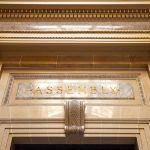Vital organist at Kenwood Methodist
Grammy-winner Paul Jacobs returns to Kenwood United Methodist to celebrate its A.O. Smith Memorial Pipe Organ.
Pop quiz: Who won the Grammy last year for Best Instrumental Soloist Performance (without orchestra)?
Give up?
The answer is Paul Jacobs, head of the organ department at the Julliard School of Music in New York, for his recording of Olivier Messiaen’s Book of the Holy Sacrament.
Sunday afternoon, the Grammy winner played a recital at Milwaukee’s Kenwood Methodist Church, in a return engagement: 10 years ago, just prior to his appointment at Julliard, Jacobs gave the re-dedication concert to celebrate the rebuilding of Kenwood’s A.O. Smith Memorial Pipe Organ. Sunday’s concert celebrated the anniversary.
Jacobs’ program included familiar names (Bach, Mozart, Schumann, Nadia Boulanger) and names known mainly to organists (John Stanley, Alexandre Guilmant, Jeanne Demessieux). Kenwood Methodist frequently sets up a closed-circuit television for its recitals. The camera allows the audience to see the performer’s feet as they play upon the pedal keyboard and operate the volume pedals and devices used to change the registrations of the stops of the organ. This was particularly wise for this repertoire and Jacobs. We might not have believed what we were hearing if not also seeing it.
Bach’s Prelude and Fugue in D, BWV 532, a staple of any organists’ repertory opened the recital. Jacobs has performed the complete works of Bach on several occasions during his undergraduate study and has lived with the piece for many years. His history with it was evident in the well-considered interpretation and flawless performance.
He went on to Schumann’s Canons, opus 56, originally for piano with an organ pedalboard attached. Jacob’s colorful reading made it seem as though the piece were written for the sustained sounds of the organ and not the percussive sounds of the piano– again, flawless.
It’s a pity that John Stanley (1713-1786) is so obscure today. He was popular in his day; George Frederick Handel was a particular fan and hired him to conduct, though Stanley was blind since a childhood accident. Jacobs played Stanbley Voluntary in D minor Opus 5 No. 8 and captured perfectly both the intimate character of 18th-century English organ music and the buoyancy central to Stanley’s music.
Jeanne Demessieux (1921-1968), a French organist of legendary (or perhaps mythical) ability, is best-known today for a set of six herculean, rarely played etudes for organ. Jacobs treated us to not one but two of them. He wisely interspersed Demessieux’s phenomenally difficult, spiky, pyrotechnic etudes with Boulanger’s quieter, more conventional works.
Jacobs referenced several letters in which Mozart lamented the difficulty of writing music for a musical clock with a small self-playing organ and expressed his preference for composing for a real organ. Jacobs bridged the gap by playing three of these mechanical curiosities with his own hands. Regardless of Mozart’s dissatisfaction, the music that came out of his effort is fine.
Jacobs performed the Sonata Opus 42 by Alexandre Guilmant (1837-1911), one of the greatest organists of the 19th century. He toured the United States on several occasions, including a series of 40 concerts in 1904 at the St. Louis Exposition. In 1898, he performed in Milwaukee on the organ in the Pabst Theater– which, sadly, no longers exists. The works of Guilmant, along with the universally known Cesar Franck, occupy the pinnacle of organ repertory from the 19th century. Guilmant’s music is symphonic in scale and orchestrally colored. Jacobs’ performance made full use of the organ at Kenwood Methodist, and again showed his mastery as a performer.
Throughout the afternoon, Jacobs also showed his mastery as a raconteur, as he delivered extremely cogent and occasionally humorous commentary.
As an encore, Jacobs performed the Fugue in A minor BWV 543, a fitting book-end to the opening prelude and fugue.




















